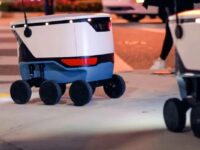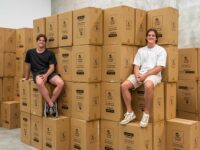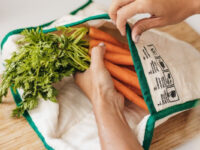
Peita Pini, managing director and founder of The Swag, was conscious of the environment from a young age. Her rural upbringing surrounded by compost heaps, a veggie garden, worm farm and animals laid the foundations for a sustainable business aimed at tackling food waste.
The Swag is a non-toxic, environmentally-friendly, machine-washable and breathable bag, meaning it enables fruits and vegetables to breathe and hydrate, keeping them fresh and nutrient-rich for two weeks on average.
“When I had children of my own, my waste-conscious upbringing came flooding back to me,” Peita told Inside FMCG.
“Weary of the extent of fresh food waste in my own home, I started noticing condensation building up inside the bag or container. This condensation is actually valuable nutrients leaving the produce. Each hour or day it is trapped in plastic, [it’s] actually suffocating. Fresh produce is living and breathing, and all living things need air and water to survive. So I set out to fix the problem.”
When she moved to the city she had no idea of the online retail world or the textiles industry, but after several years of trial and error in her kitchen she found a permeable solution that worked. Starting small, The Swag was initially given to “80 family, friends and complete strangers”. After a positive response she embarked on a research trip to India.

“We flew to India where we met with five textile manufacturers. It was important to meet the owners; study the facilities; understand fair trade/ethical practices; meet the workers plus analyse their systems, processes and materials. We learnt an incredible amount whilst in India and we left with a firm understanding of which manufacturer we were going [to] move forward with, which was really exciting.”
The Swag is completely handmade using natural fibres. It is ethically produced and made to last for years, adhering to the company’s zero waste ethics. Peita noted, however, that making the central layer is quite costly and difficult to perfect using 100 per cent natural materials.
The unique three-layer system was then patented in Australia, the US, South Africa and Europe, and they plan to add more patents in other countries in the future.
Food waste is a significant issue, with about 1.3 billion tonnes of food wasted every year around the world.
“Every time food is wasted, it drives up the cost of all food, which means we are literally taking food from the mouths of the hungry. Fast forward to 2050, where the global population is predicted to be around 9 billion, we will need … two planet Earths to feed the global population. For many of us, fresh fruit and vegetables will be unaffordable,” she said.
The Swag founder said it’s important to create workable solutions at each and every stage from producing, processing, retailing to consuming to address the problem of food waste. She said consumers and businesses can create healthy and sustainable habits that can lead to global food security in the future.
“FMCG has reached the tipping point now and sustainability is a concern all over the world. In five years, it will be a key buying criteria and all manufacturers/brands will have altered their practices to be sustainable. Social and sustainable business practices help improve brand image and if done right with integrity, can easily improve the financial bottom line.”
















